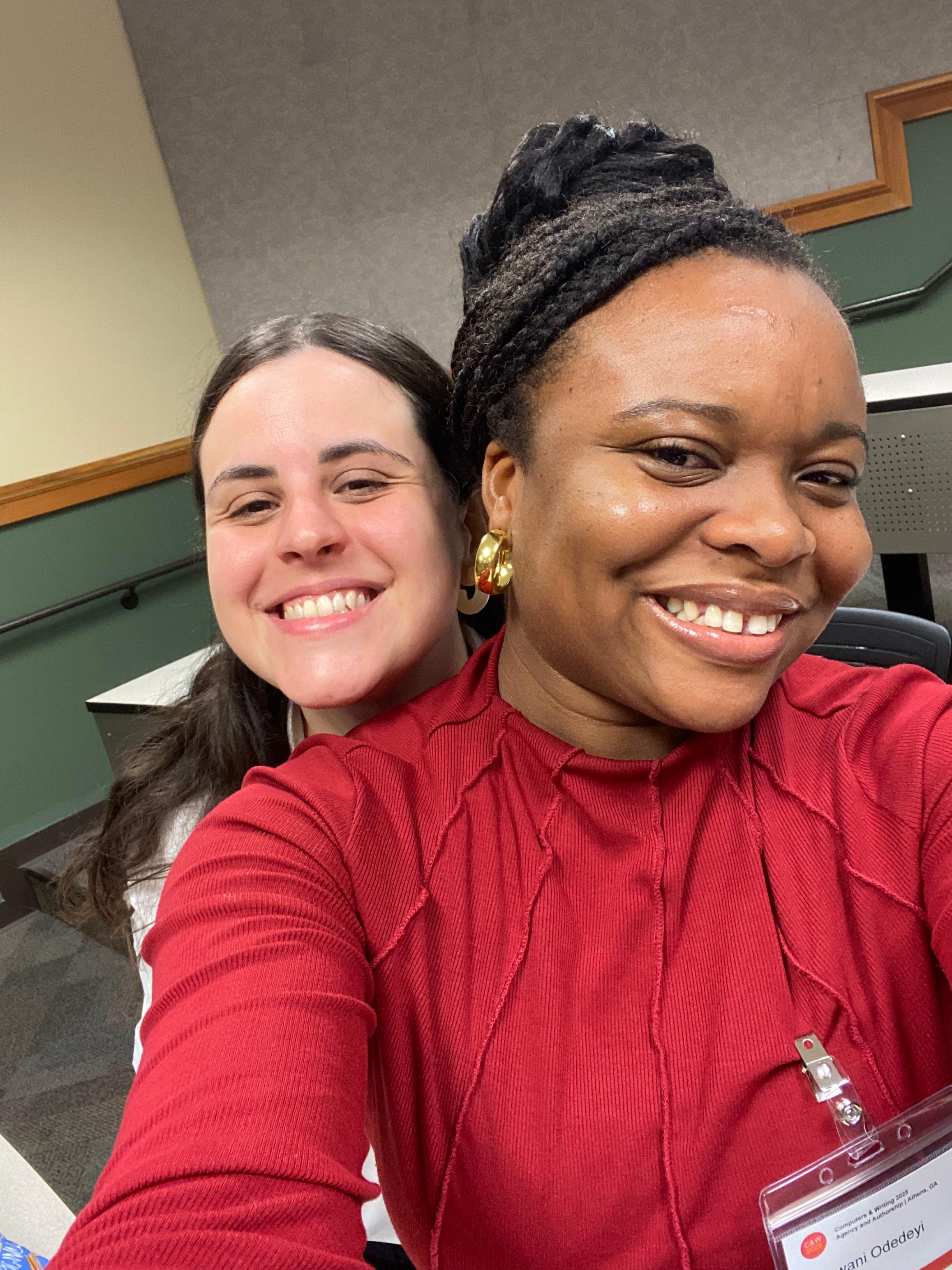A “Yack” in DRC terminology is a collaborative conversation that brings together multiple perspectives on shared themes in digital rhetoric. In this Yack, we explore how our transnational experiences as Global South scholars shape our approaches to digital rhetoric scholarship. We examine how our journeys, from Nigerian digital storytelling and design to Brazilian academic literacies, inform our research and challenge existing frameworks in the field. Through our diverse yet connected experiences, we illustrate how transnational perspectives can transform and enrich digital rhetoric scholarship by revealing the cultural and linguistic assumptions embedded in digital technologies and academic practices.
• • •
A Practice-Based Path into Digital Rhetoric through Writing and Design- Toluwani Odedeyi
My path to digital rhetoric came from doing the work, not just studying it in textbooks or theories. I found it in the middle of real work, real stories, and real people. I am a Nigerian researcher whose path into academia was paved through hands-on work in design, storytelling, and technology. Before beginning my PhD in Technical Communication and User Experience, I spent a few years navigating the Nigerian creative and technology spaces, writing about designers and designing user interfaces and writing copy for digital products that people actually use.
After my Bachelor’s degree, I began my career writing for DearDesigner, a Nigerian digital design community where I told the stories of exceptional designers to other designers. I wrote profile stories that highlighted the journeys and creative work of Nigerian designers from interviews conducted. After transcribing the interviews, I turned their words into blog posts that were easy to read, relatable and applicable. My aim was to document their backgrounds, their journey into design, tools, challenges and inspirations. I focused on using a friendly tone and clear language so that the stories felt accessible to a wide audience. This work taught me how to write with purpose, connect with readers, and communicate technical and personal experiences in meaningful ways. It also showed me how writing can create space for community, recognition, and shared knowledge in digital environments. As Gonzales (2018) writes that design and redesign rhetorical practices are often based on available tools, resources, and material conditions. These storytelling experiences shaped the way I now think about digital rhetoric and helped prepare me for co-organizing the “Let’s Talk” interview series for the DRC blog. In many ways, this was my unintended first contact with digital rhetoric- learning how design, identity, and culture come together in the stories we tell about our work. In that role, I was engaging in digital rhetoric not only as a means of persuasion, but as a form of cultural positioning.
While working on documenting Nigerian designers, I got inspired to be a product designer and got the needed training. I eventually joined the design team at Mainstack where I designed user interfaces, wrote compelling copy and shaped user experiences from the inside. As a product designer, I worked on digital tools built for creators and entrepreneurs across more than 125 countries. I conducted user research and using Figma, I designed user flows, high-fidelity interactive prototypes and component libraries to ensure consistency and ease of navigation across the product. These designs were both functional and rhetorical. I had to think critically about hierarchy, clarity, usability and accessibility. Every call-to-action button, modal, or dashboard layout had to speak directly to the user’s needs, while respecting their diverse backgrounds and contexts. Part of my work also involved collaborating closely with software engineers to implement designs that were not only visually intuitive but also technically feasible. Writing UX copy for these interfaces was equally important. Microcopy for onboarding screens, tooltips, confirmation messages, and error states needed to be friendly, clear, and culturally aware. In this way, I was always balancing visual design with language, making rhetorical choices that guided how users interacted with the product. This is digital rhetoric in practice. I was designing interactive, multimodal, and user-centered communication systems that helped people do real things in digital spaces.
• • •
What I didn’t know at the time was that the roles of being a writer and designer were shaping my rhetorical lens. They were teaching me how meaning is made in digital spaces, how users interact with content across cultures, and how language can guide, persuade, or confuse depending on how it’s used. These experiences now inform my academic interests in how meaning and actions are made through interface, language, and design, especially when users come from different parts of the world and bring diverse ways of reading, interpreting, and engaging with technology.
Being Nigerian is a central part of my lens. In our digital spaces, storytelling is everywhere: it’s how we share knowledge, build communities, market products, and teach. We tell stories to pitch projects, explain UX choices, navigate clients, and craft identities. Our stories are full of code-switching, multilingual expression, and cultural cues that don’t always translate in traditional academic or Western frameworks. However, they’re powerful, and they’ve taught me that digital rhetoric is about people, and the ways they bring their full selves into digital interaction. This rhetorical fluency, learned in local and digital contexts, is what I now bring into my academic practice. This is why my work as a DRC Fellow means so much to me. The Digital Rhetoric Collaborative is a space where emerging scholars like me can write, reflect, and collaborate. It’s a space where my experiences in the Nigerian digital ecosystem aren’t separate from my academic life, but rather, informs it. Through the DRC, I’ve been able to collaboratively work on a talk series which highlights scholars that transitioned from academia into UX and technical communication roles. This project is personal, rooted in my understanding of how many of us navigate identity and career paths across both academic and industry worlds.
The DRC’s structure makes this kind of work possible. Built on a flexible and accessible WordPress platform, it allows rhetorical authorship that is collaborative, iterative, and multimodal. As Roine and Piippo (2021) describe, such platforms allow for the assemblage of multiple voices into a final, networked piece that expands both visibility and complexity in academic authorship. For me, the interface mirrors the kind of digital space I was creating in. My digital storytelling background serves more as a foundation to my academic training, not just an add-on. In Nigerian digital spaces, storytelling, as a rhetorical mode, is embedded in a lot of things we do. We tell stories to pitch projects, explain UX choices, navigate clients, and craft identities. This rhetorical fluency, learned in local and digital contexts, is what I now bring into my academic practice.
Therefore, when we talk about rhetorical agency in digital spaces, I see it as something that can be deeply shaped by multicultural and transnational backgrounds. It’s not just about how we write or design, it’s about who we are, where we come from, what we have done and how those things show up in the choices we make, the stories we tell, and the communities we build.

Toluwani and Thais during their first ever in-person meeting and collaboration at the 2025 Computers & Writing conference in Athens, Georgia.
From Brazil to Transnational Digital Rhetoric – Thais Rodrigues Cons
The very first time I encountered theories of rhetoric at a graduate seminar at the University of Arizona, I felt the familiar weight of translation. Not just linguistic, but cultural, epistemological. I found myself mentally converting not just from Portuguese to English, but from one entire way of understanding writing, discourse, and the world to another. Yet with time and grappling with reflection, somewhere in that discomfort, I began to realize that this act of constant translation didn’t need to be seen as a deficit. It could be understood as a different form of knowledge production (Gonzales, 2018).
Now, two years into my PhD, I’ve come to understand that my experience as a Brazilian scholar navigating U.S. academic spaces reveals how knowledge travels, transforms, and sometimes gets lost across borders. When I learned about the Digital Rhetoric Collaborative, I could see precisely that diversity being valued and amplified through the voices of other transnational scholars and fellows. A digital community that not only welcomed this complexity of positionalities, but saw it as an asset to understanding how digital technologies shape our scholarly and social worlds.
As Toluwani beautifully articulated earlier, the DRC’s collaborative structure allows us to bring our full selves into digital interaction. This felt revolutionary to me, after years of academic spaces that seemed to demand I choose between being personal and reflective, or being scholarly. Here, I could be both and all.
• • •
My current research centers on a deceptively simple question: how do the everyday digital documents that govern our lives, application forms, policy notices, institutional communications, either open doors or slam them shut? In Brazil, where I conducted most of my academic trajectory, including my master’s research, these bureaucratic texts are everywhere, determining who gets into universities, who receives funding, and who accesses public services. These notices are written in the language of fairness and transparency, yet they often might exclude the very people they claim to serve.
This work draws from what scholars call the social justice turn in technical communication, recognizing that genres are active participants in reproducing or challenging power structures (Agboka & Dorpenyo, 2022). When I analyze these digital documents, my intention goes beyond examining writing processes or tools. My aim is to examine how societies decide who belongs and who doesn’t, often through seemingly mundane design choices and linguistic conventions.
The theoretical frameworks that guide this work emerge from both sides of my transnational experience. Brazilian critical literacy traditions, rooted in pedagogies of liberation (Freire, 1970), teach us to read the world as well as the word, to see how texts both reflect and shape social realities. Decolonial theory provides tools for understanding how colonial knowledge systems continue to operate through digital platforms and bureaucratic genres (Mignolo, 2007; Quijano, 2007), while scholarship on multiliteracies reminds us that meaning-making happens across languages, modes, and cultural contexts (New London Group, 1996).
These theoretical foundations converge with digital rhetoric scholarship, which examines how digital technologies shape discourse, power, and social relations (Eyman, 2015; Ridolfo & Hart-Davidson, 2015). Digital rhetoric’s attention to the materiality of digital texts, either their coded infrastructures, interface designs, and circulation patterns, provides a framework for understanding how decolonial critique operates in digital spaces. In my research, this interferes with every click, every dropdown menu, and how these features carry rhetorical weight– these design choices actively shape who can participate and how. When I bring together decolonial theory and multiliteracies with digital rhetoric, I’m able to trace how colonial logics get embedded in the digital architecture of these documents, and how equity and access are gatekept through a seemingly simple act such as filling out an application form.
• • •
My year as a DRC Fellow, along with my PhD coursework and professional development experiences, has made me grapple more and more with my locus of enunciation. This is the theoretical concept that asks what we know and from where we know it (Diniz de Figueiredo & Martinez, 2021). Mine is inevitably shaped by navigating between Brazilian and U.S. academic contexts, but also by the complex realities of privilege and positioning across borders.
In Brazil, I recognize both my racial and class privilege, having had access to a quality education and in a middle-class family within a society structured by structural inequalities. Yet in the U.S., I position myself as a first-generation Latina, navigating academic spaces as someone from the Global South where my accent, educational background, and previous experiences have been questioned or devalued through acts of microaggressions. These shifting positionalities create tensions I’m still learning to navigate. How do I honor my commitment to social and racial justice while acknowledging the privileges I’ve carried? How do I position myself as an ally in Brazilian and Latinx movements for linguistic justice and equity while recognizing that my experience of marginalization in U.S. contexts is different from that of scholars who face racialized oppression or significant oppression in multiple contexts?
This positioning as someone who is “privileged within Brazil itself” yet “often positioned in marginalized ways within the global academic context” (Diniz de Figueiredo and Martinez, 2021) is an analytical framework that requires constant self-reflection. Within the frameworks of digital rhetoric, this allows me to see how digital technologies can either reinforce linguistic hierarchies or create space for more diverse ways of communicating and belonging, while also pushing me to consider whose voices and experiences might still be excluded from these conversations.
Self-reflection is thus becoming increasingly important to my own research as well, especially when analyzing bureaucratic documents in public universities in Brazil. Reflecting on my own complex relationship to institutional power allows me to better question how these digital texts create different experiences of inclusion and exclusion for users navigating similar, but distinct, forms of marginalization.
• • •
The Digital Rhetoric Collaborative has been transformative as an intellectual community and as a model for what transnational collaboration can look like. Through collaborative projects and ongoing conversations, such as this Yack reflection, the DRC creates space for what research calls “assemblage of multiple voices,” reflecting how knowledge is actually produced across cultural and linguistic boundaries.
Perhaps most importantly, the DRC has taught me that my constant work of translation (Gonzales, 2018) between languages, between theoretical traditions, between ways of being in the world has become a way of producing knowledge that honors multiple traditions while creating something new. When I write for the DRC community, I’m trying to find ways to bring my Brazilian self into conversation with digital rhetoric scholarship in ways that benefit both. The platform’s collaborative structure mirrors the kind of digital spaces I hope to help create through my research: accessible, multimodal, and genuinely inclusive of diverse ways of knowing and communicating.
The work we do as transnational scholars reveals how existing frameworks are shaped by particular cultural and linguistic assumptions. Our experiences of navigating multiple educational systems, of constantly translating between ways of knowing, and of adapting global technologies to local contexts provide methodologies that can help the field better understand its own assumptions and possibilities. Here in the DRC, we got to build a transnational scholarly community of fellows, and are constantly learning from each other and our scholarship. Toluwani and I have collaborated and created publications together. We also highlight current fellow Mehdi Mohammadi (2024), and past fellows Gupta (2024), Anand (2024), Zhang (2024), and many others. As I continue developing my research on digital genres and social justice, I carry with me the DRC’s vision of digital rhetoric as fundamentally about people and the technologies that shape how we connect, create, and belong. This labor feels both urgent and hopeful, a way of imagining and building more inclusive digital futures.
• • •
References
Agboka, G. Y., & Dorpenyo, I. K. (2022). The role of technical communicators in confronting injustice—everywhere. IEEE Transactions on Professional Communication, 65(1), 5-10.
Anand, S. (2024). Decolonizing tutor and writing center administrative labor. The Writing Center Journal, 42(1), 107-123.
Diniz de Figueiredo, E. H., & Martinez, J. (2021). The locus of enunciation as a way to confront epistemological racism and decolonize scholarly knowledge. Applied Linguistics, 42(2), 355-359.
Eyman, D. (2015). Digital Rhetoric: Theory, Method, Practice. University of Michigan Press.
Freire, P. (1970). Pedagogy of the oppressed. Continuum.
Gonzales, L. (2018). Sites of translation: What multilinguals can teach us about digital writing and rhetoric. University of Michigan Press.
Gupta, A. (2021). Emotions in academic writing/care-work in academia: Notes towards a repositioning of academic labor in India (& beyond). Academic Labor: Research and Artistry, 5(1), 7.
Mohammadi, M. (2024). Rhetoric and Posthumanism. Available at SSRN 5256275.
Mignolo, W. D. (2007). Delinking: The rhetoric of modernity, the logic of coloniality and the grammar of de-coloniality. Cultural Studies, 21(2-3), 449-514.
New London Group. (1996). A pedagogy of multiliteracies: Designing social futures. Harvard Educational Review, 66(1), 60-92.
Quijano, A. (2007). Coloniality and modernity/rationality. Cultural Studies, 21(2-3), 168-178.
Ridolfo, J., & Hart-Davidson, W. (Eds.). (2015). Rhetoric and the Digital Humanities. University of Chicago Press.
Roine, H. & Piippo, L. (2021). Authorship vs. Assemblage in Digital Media. 10.4324/9781003123996-7.
Zhang, J. (2024). User-centered Content Strategy for Communicating Public Health Crisis: A Study of University Risk Communication During COVID-19 Pandemic (Doctoral dissertation, Texas Tech University).
Illustration on banner by Dedraw Studio on Adobe Stock (file #570654853)


